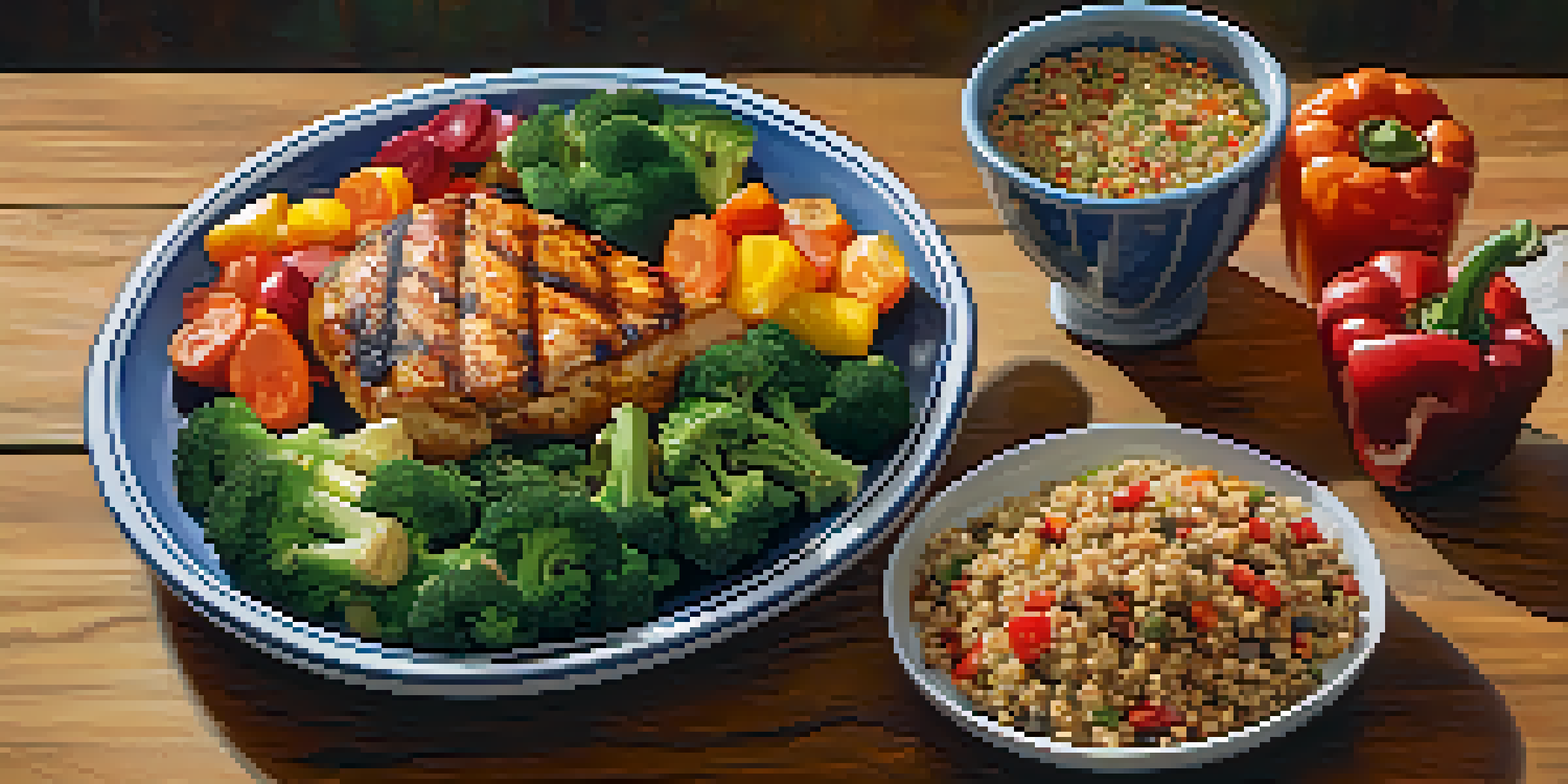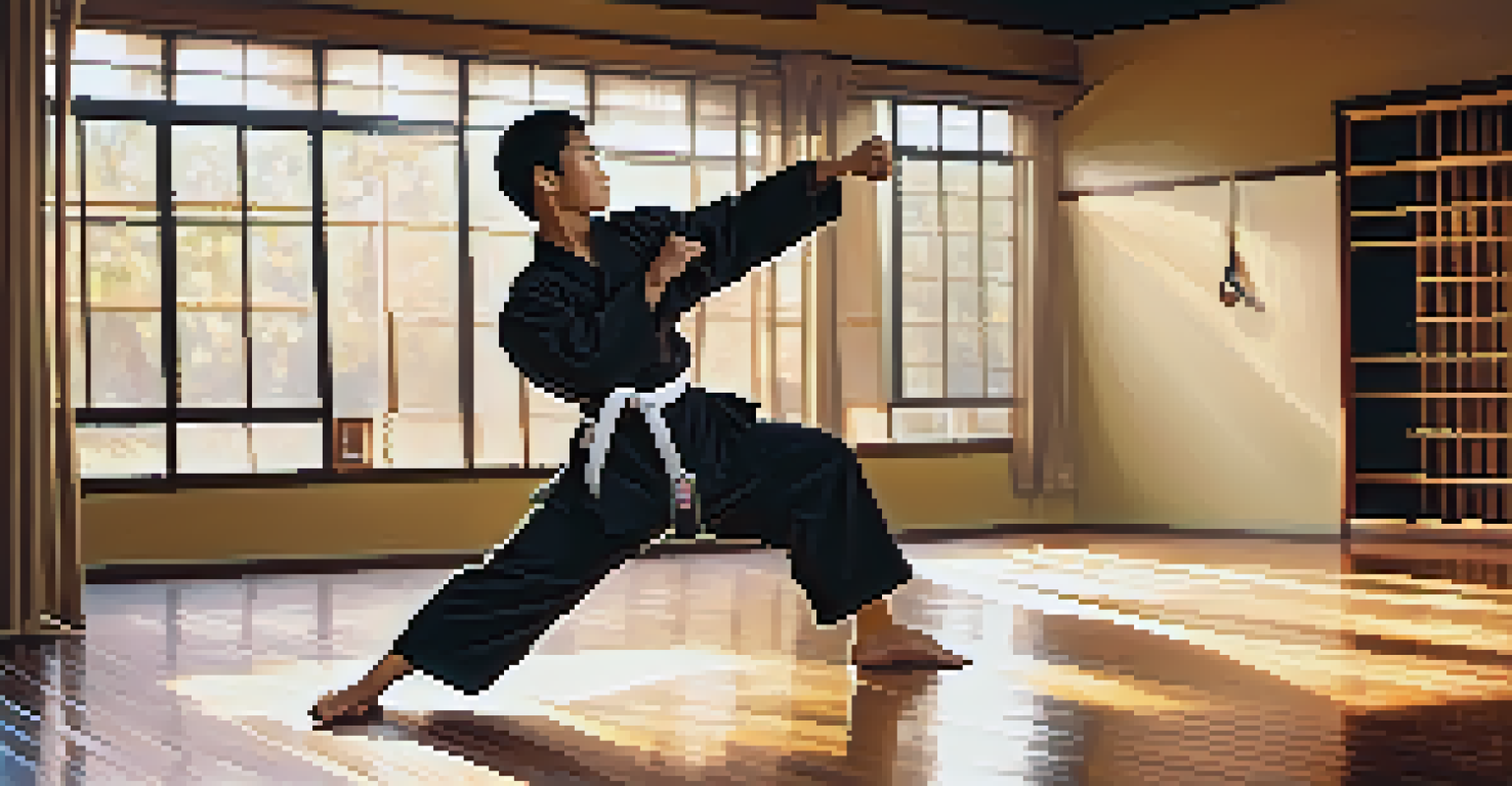Nutrition for Weight Management in Martial Arts Competitors

Understanding the Role of Nutrition in Martial Arts
Nutrition plays a crucial role in the performance of martial arts competitors. It fuels their training and helps maintain optimal body weight, which is vital for competing in their respective weight classes. Proper nutrition can also aid in recovery after intense training sessions, ensuring athletes are ready for their next challenge.
You are what you eat, so don't be fast, cheap, easy, or fake.
For martial artists, the right balance of macronutrients—proteins, fats, and carbohydrates—is essential. Each macronutrient serves a specific purpose; for instance, proteins support muscle repair, while carbohydrates provide the energy needed for rigorous training. By understanding these roles, competitors can make informed dietary choices that enhance their performance.
Ultimately, nutrition is not just about eating well; it's a strategic component of a successful training regimen. Athletes who prioritize nutrition can improve their strength, endurance, and overall performance, making it a fundamental aspect of martial arts training.
Creating a Balanced Diet for Weight Management
A balanced diet is key for martial arts competitors looking to manage their weight effectively. This means incorporating a variety of foods from all food groups, ensuring that the body receives essential vitamins and minerals. Whole grains, lean proteins, healthy fats, and plenty of fruits and vegetables should all have a place on their plates.

Portion control is another important aspect of maintaining a balanced diet. By being mindful of serving sizes, competitors can prevent overeating, which is crucial when trying to stay within a specific weight class. Utilizing tools like measuring cups or food scales can help athletes better understand their portion sizes.
Nutrition Fuels Martial Arts Success
Proper nutrition, including a balanced intake of macronutrients, is essential for enhancing performance and recovery in martial arts.
Moreover, meal timing can significantly impact energy levels and weight management. Consuming smaller, nutrient-dense meals throughout the day rather than a few large meals can help maintain energy levels while preventing excessive hunger, setting up competitors for success in their training.
Hydration: A Key Component of Nutrition
Hydration is often overlooked but is essential for martial arts competitors. Proper hydration helps with digestion, nutrient absorption, and keeping energy levels high during training sessions. Drinking enough water can also prevent fatigue and improve overall performance in the ring or on the mat.
Nutrition is not just about the food you eat, but how it fuels your performance and recovery.
Athletes should pay attention to their hydration needs, especially during intense workouts. It's not just about drinking water; competitors can also benefit from electrolyte-rich drinks to replenish lost minerals. Understanding when to hydrate can make a significant difference in performance and recovery.
Additionally, monitoring urine color can be a simple yet effective way to gauge hydration levels. A pale yellow color generally indicates good hydration, while darker shades suggest the need for more fluids. By staying attuned to their body's needs, martial artists can optimize their hydration strategy.
Timing Your Meals for Optimal Performance
Meal timing can greatly influence performance in martial arts. Eating the right foods before and after training can enhance energy levels and recovery. Competitors should aim to consume a balanced meal with carbohydrates and protein about two to three hours before training to fuel their workouts effectively.
Post-training nutrition is equally important. Consuming a meal or snack that includes protein and carbohydrates within 30 minutes after training can boost recovery and help replenish glycogen stores. This practice not only aids in muscle repair but also prepares athletes for their next training session.
Hydration is Crucial for Performance
Staying adequately hydrated is key for martial artists, as it supports energy levels and overall performance during training.
Finding the right timing may require some experimentation. Each athlete is unique, and discovering the optimal pre- and post-workout meals can lead to improved performance and better weight management over time.
Incorporating Supplements Wisely
Supplements can be beneficial for martial arts competitors, but they should complement a solid nutrition plan rather than replace it. Common supplements like protein powders, omega-3 fatty acids, and vitamins can support overall health and performance when used appropriately. However, it's crucial to consult with a healthcare professional before starting any supplementation.
Understanding the purpose of each supplement can help athletes make informed choices. For example, protein powders can be a convenient way to meet protein needs, especially for those with busy schedules. However, relying solely on supplements without a balanced diet may not yield the desired results.
Ultimately, supplements should be viewed as an addition to a healthy diet. When used wisely, they can enhance performance, but they should never replace the foundation of proper nutrition.
Managing Weight Cuts Safely and Effectively
Weight cutting is a common practice in martial arts, but it must be approached with caution. Rapid weight loss can lead to dehydration and negatively impact performance. A gradual weight cut, achieved through a combination of diet and training adjustments, is generally safer and more effective for competitors.
Creating a realistic weight management plan is essential. This plan should include strategies for losing weight while still maintaining energy levels for training. Incorporating more fruits, vegetables, and lean proteins can help athletes reach their weight goals without sacrificing performance.
Individualized Nutrition Plans Matter
Tailored nutrition plans that consider personal factors lead to better performance outcomes and training effectiveness for martial arts competitors.
Additionally, monitoring body composition rather than just weight can provide a more accurate picture of an athlete's health. Focusing on building lean muscle while reducing fat can lead to better performance outcomes, making it a valuable approach for martial arts competitors.
The Importance of Individualized Nutrition Plans
One size does not fit all when it comes to nutrition for martial arts competitors. Individualized nutrition plans that consider factors like age, weight class, training intensity, and personal preferences can lead to better outcomes. Working with a registered dietitian or nutritionist can help athletes develop a tailored approach to their dietary needs.
Personalized plans can help identify specific nutrition gaps and optimize performance. For example, some athletes may require more carbohydrates due to their training volume, while others might need to focus on protein intake for muscle recovery. Understanding these individual needs can make a big difference in training effectiveness and overall health.

Incorporating feedback and making adjustments to the nutrition plan over time is also crucial. As training cycles change or weight classes shift, competitors should be prepared to tweak their diets accordingly to ensure they are always performing at their best.